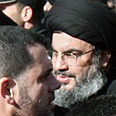
Hassan Nasrallah
Photo: AFP
Much of what has been going on in recent weeks with respect to the upcoming prisoner swap has to do with disinformation and psychological warfare. Strangely enough, Hizbullah leader Hassan Nasrallah’s interests seem to conform to those of the Israeli government.
We started with the false campaign claiming that Israel was threatening Hizbullah with the prospect of declaring that abducted troops Eldad Regev and Ehud are dead (oh, that really scared them at the Beirut headquarters, now didn’t it; in fact, it did not change the swap terms at all.)
We continued with the baseless reports about Hizbullah changing its demands, in order to justify the deal’s annulment, and we finished with leaks by interested parties aimed at somehow linking Samir Kuntar’s release to the Ron Arad affair.
The truth is that both sides are fooling their respective publics. The Israeli government is already well familiar with what Hizbullah’s report on Ron Arad says; the information contained in the report has been known to our government for a while, and it won’t help us solve the Arad mystery.
Samir Kuntar will be released in exchange for the bodies of Regev and Goldwasser, period. The rest is disinformation.
Nasrallah’s ‘achievement’
Israeli officials were not sorry to hear Nasrallah’s unfounded claim that the report contains unequivocal information that shows Ron Arad is no longer alive. This declaration means that not much can be done in respect to Arad, and therefore we can release Kuntar.
Meanwhile, Nasrallah is interested in showing that his organization made a genuine effort in respect to Arad, both to grant Prime Minister Olmert the ability to disregard the government’s pledge to the Arad family (to release Kuntar only in exchange for Arad,) and to clear Iran of involvement in the affair.
Israel, on the other hand, was glad to provide Nasrallah with an achievement in the form of a report on the four Iranian diplomats who disappeared in Lebanon. Nasrallah knows well that the report is an exact copy of a report that has already been handed over to Iran twice; it contains no new information and most of it is based on the testimony of Robert Hatem, the man who murdered the Iranians and recounted the affair to Mossad agents in 1992.
Yet all this does not stop Nasrallah from boasting, in a letter to the diplomats’ families, as though the report contains highly important details; the letter was also leaked to the Lebanese media.
In short, both sides are recycling old materials that contain nothing new and present them as priceless information being traded off.















